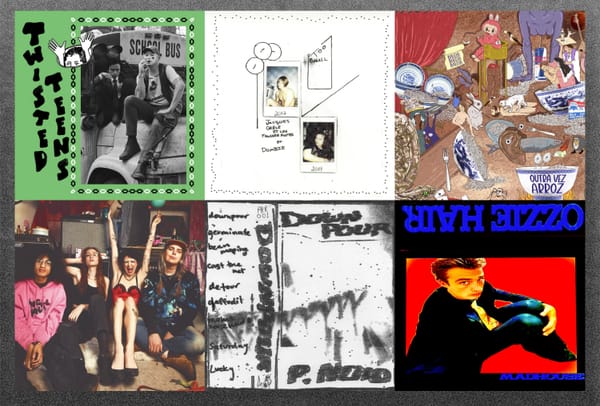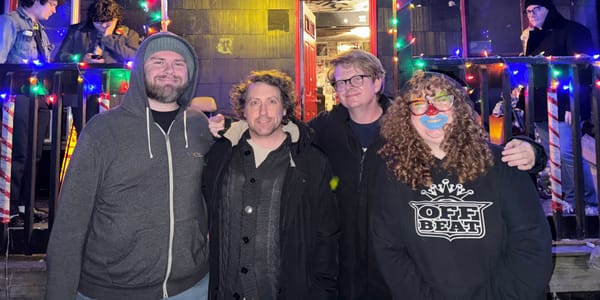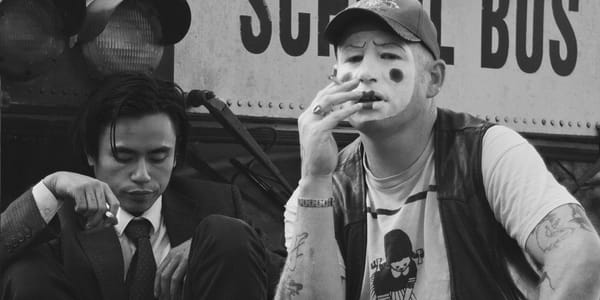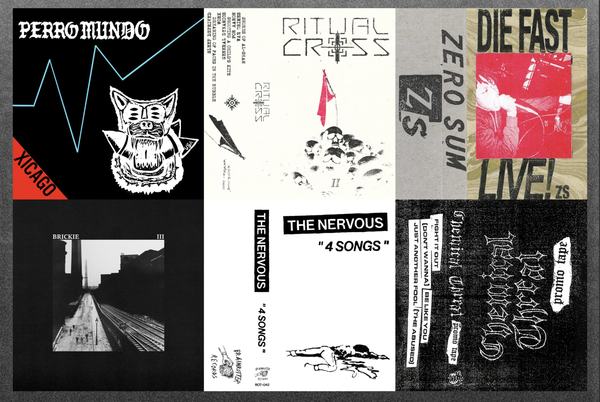the postmodern punk of powerwasher
The Baltimore band, whose debut album Everyone Laughs arrived in 2024, on their boyfriend playdate origins and critical theorist influences.
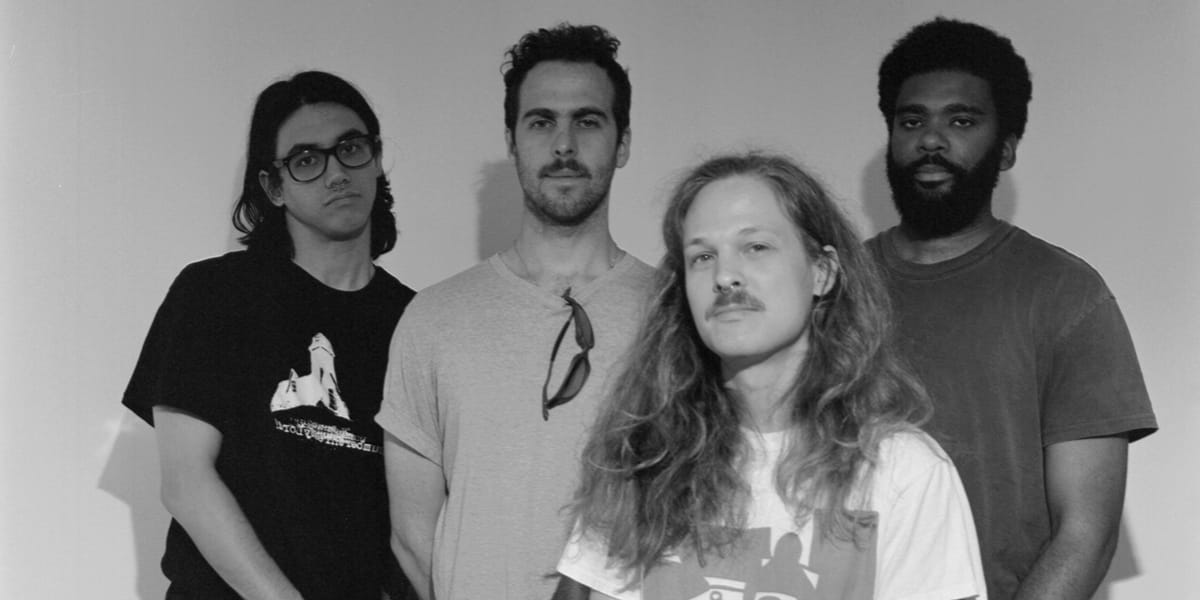
Dressed in matching pink boiler suits, Powerwasher resemble a gang of escaped art school vigilantes at their first live shows back in 2022. Taking center stage, lead vocalist Tiger reinvents his delivery on every song, casually rattling off lines like a ’90s club comic at one moment; thrashing around, all high-knees and hair in the next; and later, sitting cross-legged like a youth pastor delivering some hard-earned wisdom.
The band’s energy is, in short, difficult to pin down, a mix of Americana’s nostalgia, no wave’s nihilism, punk’s outlandishness, and post-hardcore’s fury. “We are always the weird one on the bill,” guitarist Eli summarized, speaking about the band’s place within their home scene in Baltimore over Zoom. “We play the punk bills and we're the weirdo soft band, or we play the indie rock bills and we're the weirdo way too hard band.”
Even as the odd men out, the four members of Powerwasher are happy to be playing together at all: They tracked their first EP, 2020’s The Power of Positive Washing, just before the COVID-19 lockdown, and didn’t get the chance to perform together as a band until two years later. "I was not sure we were ever going to play shows,” Spencer, the band’s drummer, recalled.
But the pandemic’s pause gave the band more time to focus on their 2024 debut full-length, Everyone Laughs, which they began writing in 2020. The record won’t get them any further from their “weirdo” status—there’s pedal steel played by Wednesday’s Xandy Chelmis, guitars that dart between riffs as if they’re about to self-destruct, and lyrics about microwaving hard drives—but it feels like a fitting introduction for perhaps the only rock band to cite the French writer Georges Bataille and Long Island post-hardcore legends Glassjaw in the same interview.
Powerwasher decorate their lyrics with the prefab shorthands of the anthropocene— “a five-piece bedroom set,” “LiveLeak streams in 1080p,” dreaming about a “home on the range” but settling for “contact sports.” On the album’s cover, painted by artist Matthew Reed (whose work you might recognize from MJ Lenderman’s Manning Fireworks), we see a fading empire in the form of a man who appears to be quite literally bowling alone.
Speaking from their individual boxes on Zoom, Eli, Spencer, Tiger, and bassist Kendall seemed especially eager to collaborate in person for a new album hopefully arriving at some point in 2025—“adult stuff” is getting in the way of “devoting our lives entirely to punk rock,” Eli lamented. But perhaps that’s just more fuel for their forthcoming record: The contrast between the soul-crushing tedium of an “email job” and the exuberance of playing in a band seems like the perfect topic for a Powerwasher song.
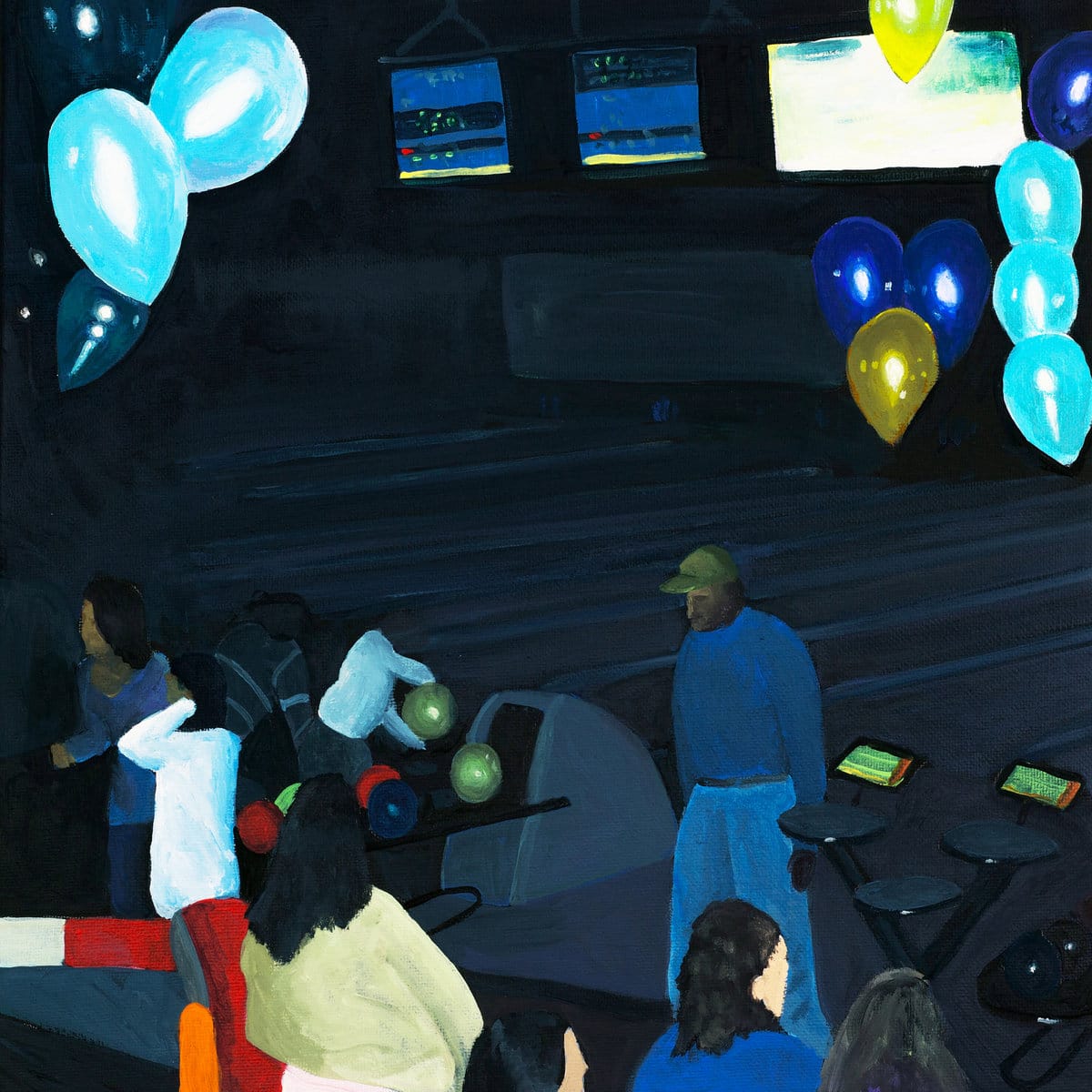
How did Powerwasher start?
Eli: Me and Kendall used to play in a different band together, where I played drums and he played bass. My now fiancé, then girlfriend and her very good friend, who was Spencer's girlfriend at the time, set us up on a boyfriend playdate, and we started jamming like that. I asked Kendall to come in and play bass, and then we met Tiger on Craigslist.
What did the Craigslist ad say?
Eli: It was something like, “If you want to play in a band that sounds like Palm, hit us up.”
Spencer: I remember Tiger sent an EP from his band in Atlanta, and I was like, “We need this guy.”
Tiger: I didn’t know you listened to it!
Kendall: Tiger only briefly lived in Baltimore, so he got everything recorded and then he moved back to Atlanta.
Tiger: It was Atlanta first, and then Wisconsin, and then New York. I’ve been bouncing all over the place. Fortunately, I’m within driving distance of Baltimore now, which makes playing shows a lot more convenient.
You released your first record, The Power of Positive Washing, in Baltimore in the peak of the pandemic. How did that impact you all as a band just starting out?
Kendall: We hadn’t played any shows when the EP came out. We didn’t even play our first show until two years ago.
Spencer: We said, “Let’s record this EP first, and then we’ll send it around and it’ll be easier to book shows.”
Eli: I remember we got an email from Nicolo from Sad Cactus, where he said, “Yeah, let’s shoot to put out the EP in August [2020], because then people will be touring again.”
Kendall: Some of Everyone Laughs was written before COVID started, and we were planning on recording the EP, and then the lockdown started and just stretched everything out.
Eli: I think it made the record better to have that much time to sit with it and think about the songs. Some of the stuff we had written before the pandemic ended up getting totally chopped up and thrown into different songs. It came out the other end very different than it would have if we had just cruised on through and recorded like we were supposed to.
What were your goals for Everyone Laughs? How did you approach it differently than your first EP?
Eli: I think our first EP was a happy accident and really spontaneous. Two of the songs were not even a third of the way written before tracking day.
Spencer: Eli and I recorded drums and guitar live together, and we had enough time, so I was like, “Let’s just try to get these songs in.” I think there were two songs that Kendall and Tiger had never heard before, and we tracked them.
Eli: One way we approached the full length differently was just taking our time with it, being more intentional, focusing on the songwriting more. Not doing it as fly by night.
Tiger: We're definitely a lot younger too. We recorded that EP when I was straight out of college. I was playing music with other guys in Atlanta and had a project fall apart, which is a very good learning experience. I feel like seeing a project not come to fruition makes you approach your future endeavors a lot differently.
Kendall: I remember one of the things that came up when we were working on the album is that it sounded like a band that was influenced by the first EP, and that's something I think we started to lean into a little bit as we kept writing songs.
Eli: Yeah, like, what if there was a band whose favorite band was the band from the last record, but was not the same band.
Like they put out a Craigslist ad looking for musicians who love Powerwasher?
Spencer: A Powerwasher tribute band.
Tiger: Being older, I think we are more restrained. We don't have to do one measure of this bar of 17, and then go to a bar of nine. We know we can do it. So we can play a song that's more withheld, although, at the end of the day, we are still the same musicians.
Do you all contribute lyrics for the band, or is there one person who's writing the lion’s share?
Tiger: Lyric-wise, I think it’s mostly Eli and I. But we try to keep things super democratic. We try not to get too pigeonholed and be the only ones with writing responsibility.
Eli: The lyric writing process tends to be that on the day that we track vocals, me and Tiger sit down with a notepad, and he has a Notes app note full of phrases that he's written down since the last time we recorded vocals. We try to piece those together into a workable stream of consciousness that hopefully means a lot to people.
Are there particular writing methods that you use, or writers that inspire you?
Tiger: That depends on the project. I'm not really good at reading prose or fiction. I mostly just read critical theory in my free time, which doesn't really translate to coming up with the most artistic lyrics, per se. Writing lyrics is difficult because there's a balance to strike between saying too much and saying too little, or saying something trite.
One of the things that turns me off from other bands the fastest is hearing something super cliché. Finding the right balance of something that resonates with other people but hasn't been said a million times, maybe more skilled writers would say that’s easy, but to me, I find it particularly difficult.
Are there any critical theorists in particular who inspire your lyrics?
Tiger: This is not technically critical theory, but I dug pretty deep into [Georges] Bataille for this forthcoming EP we recorded recently. It’s our Bataille and Mishima record.
Spencer: Bataille wrote The Story of the Eye, right?
Tiger: You guys were making fun of me! We were playing at a beach bar in New Jersey, in Belmar or something, and I was trying to get my reading in. They were like, Tiger, you can't read Story of the Eye in public like this!
Eli: Well, to be fair, there were mostly leathery, middle aged people drinking margaritas and buckets of beer around us. It just felt inappropriate.
Your song “Same Time/ Same Channel” is a biting critique of influencer culture. There are also a lot of obscene references that now seem connected to Bataille. I was curious what you were thinking specifically when you were writing that song.
Tiger: I actually just read Immediacy, or The Style of Too Late Capitalism by Anna Kornbluh. And I was like, Damn, I wish I had known this book existed when I was writing that song. It probably would have been easier to just copy from her work. We recorded that in 2021, during lockdown. That was definitely the apex of everything just being content. We were taking in all of reality through this very mediated form of cultural production, and that has a depersonalizing effect.
One of the things that Eli and I have talked a lot about while we’re writing lyrics is that everything is on one social media feed: News of 300 victims of a landslide in Bangladesh, your cousin having their first kid, and this petition you should sign, they all become squashed into one monolith of dopamine-rewarding content consumption. So I guess that was the idea for that. That was definitely the “we’re at home, taking the world through social media lockdown” song.
Then you have a song like “Stoned,” which is much slower; you’ve got Xandy Chelmis on the pedal steel. What was the writing process like for that?
Eli: Part of the secret sauce of Powerwasher is that half of the songs start with what could be a Rolling Stones riff. At some level, it's really not that different. You just dial back all of the unhinged stuff to 2%.
Spencer: I don’t remember when Tiger wrote that song, but I do feel like, in a sense, it’s a good link between the EP and the album, because there were some slower, more reserved moments on the EP, like “You Were Just Here” and the beginning of “Hard to Explain.”
Tiger: Another thing about that is also just the baggage that you bring into a band. When you sit down with three other people to write music, you’re pulling from the same influences, picking up your guitar the same kind of way. Even if we consciously think we're going to write a slower, country style song… “We exist in the context of that which came before us.” It's going to make it sound like a Powerwasher song.
Spencer: I could not put it into words at all, but when we're writing stuff now, we'll have a riff or a passage, and we'll be like, “It's not quite Powerwasher-y.” We set it aside. I don't really know what that means, but it feels instinctive.
Do you have any shared influences besides Palm and the Rolling Stones? I'm curious about what the Powerwasher extended universe looks like.
Eli: I think the big shared one is Death Grips.
Tiger: I think Spencer is the only one who listens to post-punk music.
Spencer: For the album, I remember I had been obsessed with this album for a long time by the Hecks, I think it's just self-titled. And Dave Vetrano, the guy that ended up mixing our album, it was his band. I don't know if I’d call it post-punk. It's borderline no wave. That was a big influence for me during the pandemic and when I was approaching the album. I feel like, strangely, I’m the one that listens to the most guitar music, but I play drums. I have written a couple things on guitar for Powerwasher, but not a ton.
Eli: I’m pretty much only listen to rap music.
Tiger: During the pandemic, I was listening to Pet Sounds every single day. That and Squarepusher.
Kendall: Eli and I both like a lot of 2000s post-hardcore stuff, and some of that kind of leaked into the writing process. At the Drive-In, Glassjaw, that kind of stuff came out a little bit, mixed with the post-punk influence.
Eli: While we were working on it, I was kind of joking that this record is like Talking Heads meets At the Drive-In.
What is the role of humor in the band? I feel like I’m laughing as much as I’m wincing at how real the lyrics are.
Tiger: I don’t think we’re funny at all! [laughs] We try to have a good sense of humor about things. I feel like humor is the only way you could possibly respond to how fucked up everything is. I think that bleeds through. But I think playing music with people, you’re there to have a good time at the end of the day. If you can say something insightful, that’s a bonus.
Kendall: It also often feels a little silly to take stuff too seriously, especially playing in a rock band as a 30-year-old. It just seems goofy to think about it too hard.
Tiger: I’m so angry, I hate the world, I’m so depressed. Yeah, now watch a grown man stand in front of you and sing a song about it? You’ve gotta be a good sport.
How do you feel like you fit into the Baltimore music scene right now?
Eli: We’re the best band in Baltimore! [laughs] No, we’ve got some good friends in the scene. Shout out Muscle and Ripley Void.
Kendall: There are not many bands like us in Baltimore, which feels like a good and bad thing sometimes.
What does next year look like for Powerwasher?
Spencer: We’re working on an EP, but there’s no release date for that.
Eli: There’s a bunch of adult stuff getting in the way of devoting our lives entirely to punk rock. Tiger’s got a new job, I’m getting married in April, so you have to plan around PTO and all this other shit.
Tiger: I have a 401K now! I’m moving up in the world.
Eli: Yeah, “Catalog” was a spell. You manifested it.
Tiger: Having a Zoom or email job is corrosive to the human psyche. We’ll see how long this lasts.
Spencer: We do have more specific goals with the next thing we're going to write, but I don't know if we should go into detail because if we fail at that achievement, I don’t want to have egg on my face. But Eli said he was writing songs to appease my taste.
Eli: Yeah, basically Spencer told me that I couldn't do any more emo bullshit on guitar, so I tuned to drop D, and I’m only playing power chords.
Spencer: Because we are sort of a long distance relationship band, I'd like to try a more collaborative approach than we've been able to do before. But again, we'll see if life gets in the way.
Kendall: The three of us in Baltimore usually write all the songs, and then Tiger comes in and does vocals when we start recording.
Spencer: Now that we're playing shows, Tiger will come to Baltimore for a weekender, and there is more collaboration than there was for the full length already, but it'd be nice to have even more if possible.
Eli: We’re all pretty excited about the new record. It sounds extremely different from anything we’ve put out before, in a good way I hope. I think there's some chance that if you loved Everyone Laughs, you will not love this. But it’s very Powerwasher in that it is, I think, very punk and unhinged.
see/saw is a reader-supported publication. If you enjoyed this article, please consider a subscription to support this independent punk journalism operation.

